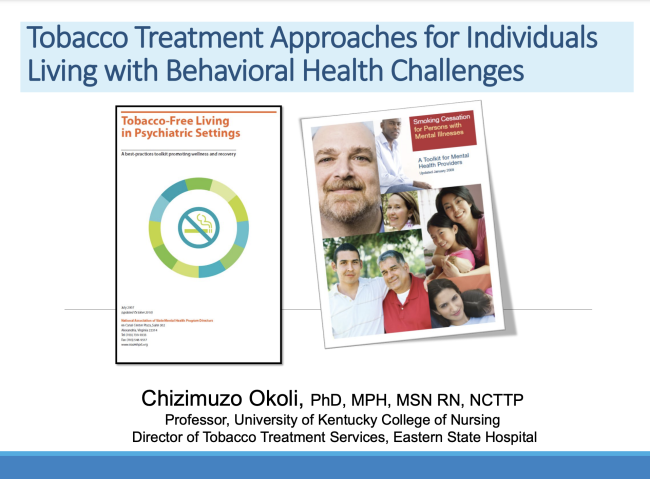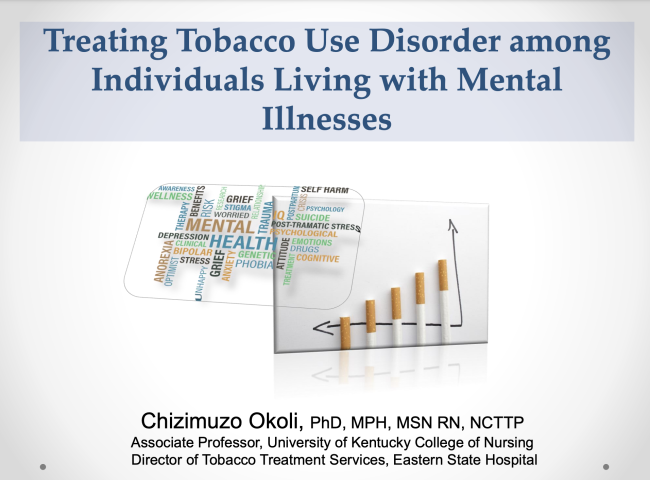Below are some training materials related to the effects of tobacco use in various populations. This includes presentations by Dr. Okoli and BH WELL's "Lunch and Learn" spring 2022 webinar series.
Trainings and Education
Trainings
BHWELL's on-demand course modules are approved for Continuing Education credit through the Kentucky Board of Nursing and the Kentucky Board of Social Work. Download our flyer or visit the modules below to learn more.
Stopping Smoking Mindfully
Are you anxious about how to lead a mindful breathing activity for your patients? We lead you through an example of basic aspects of how to use your voice and a simple script for working with your patients to help them calm themselves.
Simulated Scenarios
Below you'll find our 5A's simulated scenario training. Each video features a scenario with a clinician and a patient living with either Major Depressive Disorder, Substance Use Disorder, ADHD, or Schizophrenia. The clinician aids the patient in stopping tobacco use by employing the 5A's: Ask, Advise, Assess, Assist, and Arrange.
Education
Dr. Lovoria Williams presents "Pharmacotherapy Considerations For Tobacco Cessation: Neuroleptics"
Dr. Lovoria Williams hosted this virtual seminar on April 20, 2022 as a part of BH WELL's "Lunch and Learn" series. Her presentation titled, "Pharmacotherapy Considerations For Tobacco Cessation: Special Considerations With Neuroleptics" was followed by a few minutes of Q&A.
Motivational Interviewing and Behavioral Counseling : Skills To Enhance Therapeutic Engagement
Dr. Lee Anne Walmsley hosted this virtual seminar on March 16, 2022 as a part of BH WELL's "Lunch and Learn" series. Her presentation titled, "Motivational Interviewing and Behavioral Counseling For Those With A Mental Illness: Skills To Enhance Therapeutic Engagement" was followed by 15 minutes of Q&A.
Tobacco-Free Policy Implementation: Special Considerations
Dr. Janet Otachi hosted this virtual seminar on February 16, 2022 as a part of BH WELL's "Lunch and Learn" series. Her presentation was followed by 15 minutes of Q&A.
Tobacco Use: The Hidden Epidemic
Dr. Zim Okoli hosted a presentation titled, "Tobacco Use and Mental Illness: Addressing the Hidden Epidemic" in a BH WELL monthly lunchtime seminar via Zoom on January 19, 2022, from 12-1 PM EST. This 30-minute teaching was followed by 30 minutes of Q&A.
Tobacco Treatment Approaches for Individuals Living with Behavioral Health Challenges
Dr. Zim Okoli created this presentation to address tobacco treatment policies in behavioral health settings. The presentation explores a logic model for implementing and evaluating processes needed to provide a healthy environment to achieve wellness and recovery goals by de-normalizing tobacco use and promoting tobacco cessation.
Treating Tobacco Use Disorder Among Individuals Living with Mental Illnesses
This presentation by Dr. Zim Okoli discusses Tobacco Treatment and Mental Illness. It outlines a brief background on tobacco product use, discusses the tobacco use epidemic among people with mental illness (MI), and reports behavioral treatment considerations and pharmacotherapy for tobacco treatment among people with MI.
Engaging Clients with Mental Illnesses and Behavioral Health Challenges in Tobacco Treatment
This presentation focuses on tobacco use in populations living with mental illness. It discusses the importance of recognizing tobacco treatment in the behavioral health population as normal. The tobacco companies have worked for years to target individuals living with mental illness, using psychology to market tobacco use as a way of coping and belonging while pocketing $37 billion from people living with mental illness who use tobacco products. Nicotine addiction is treatable in individuals living with mental and behavioral health challenges. While conventional methods of tobacco cessation do not work with this population, there are ways to tailor tobacco treatment so that it can be effective for individuals living with mental illness.
Calling It Quits Intro | Calling It Quits | KET
KET featured Dr. Zim Okoli among other tobacco experts in the program, Calling It Quits: Real Help to Stop Smoking. The show aired on December 18, 2017, at 8 pm on KET, and examines effective medications and behavioral strategies for tobacco users to quit.
Recovery in Mental & Behavioral Health Care: Tackling the Hidden Epidemic of Tobacco Use
This workshop will provide targeted behavioral health tobacco treatment training for tobacco treatment specialists, health educators, and other health professionals. This workshop is funded through a grant from the Kentucky Tobacco Prevention and Cessation Program via the Centers for Disease Control and Prevention.
Continuing Education Credit: This workshop has been approved for 3 CEs through the Kentucky Board of Nursing and 3 CEs through the Kentucky Board of Social Work.


